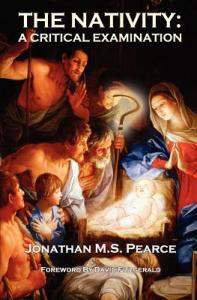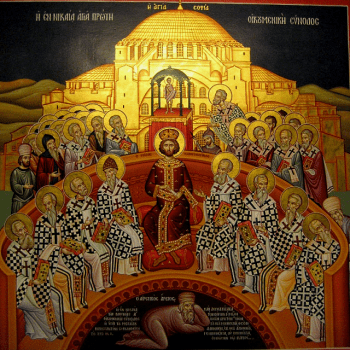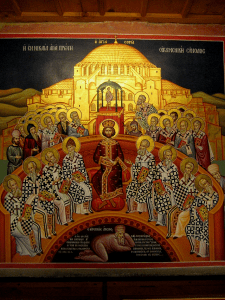Jesus “Scarcely” Talks About Himself in the Synoptics? No Parables At All in John?
Bart Ehrman is one of the most well-known and influential critics of traditional Christianity and the inspired Bible (“anti-theists”) writing today. Formerly, in his own words, he was “a fundamentalist for maybe 6 years; a conservative evangelical but not extreme right wing for maybe 5 years more; and a fairly mainstream liberal Christian for about 25.” The primary reason he gives for having lost his faith is the problem of evil (a very serious topic I have dealt with many times). He stated on 3-18-22 in a comment on his blog: “I could no longer explain how there could be a God active in this world given all the pain and misery in it.” I don’t question his sincerity, good intentions, intellectual honesty, or his past status as a Christian; only various opinions which Christians must (in consistency) regard as erroneous.
Dr. Ehrman “received his PhD and MDiv from Princeton Theological Seminary, where he studied textual criticism of the Bible, development of the New Testament canon and New Testament apocrypha under Bruce Metzger.” He has written 30 books, which have sold over two million copies and have been translated into 27 languages.
Ehrman explains that the purpose of his blog is “to disseminate scholarly knowledge of the New Testament and the earliest periods of the Christian church to a non-scholarly audience, . . . Every post is rooted in scholarship – not just my own but that of thousands of scholars who have worked for centuries on understanding the historical Jesus, the New Testament, and the origins of Christianity.” Well, the conclusions of scholars are only as good as the solidity and truthfulness of the premises by which they are operating.
This is one of a series of reply-papers, in which I will address many of his materials from the perspective of archaeology, history, and exegesis.
*****
I am responding to his article, Is This the Same Teacher? Jesus in John and the Synoptics. (10-4-17). His words will be in blue.
In the Synoptic Gospels, you will have noticed that Jesus scarcely ever speaks about himself. There his message is about the coming kingdom of God and about what people must do to prepare for it. His regular mode of instruction is the parable.
To the contrary, He massively speaks about himself, by using the method of referring to Himself as the “Son of Man.” Elsewhere (in many posts), Ehrman tries to vainly argue that Jesus thought the Son of Man was someone else. But this won’t fly. His use of the phrase clearly is referring to Himself, as countless clues from immediate context prove. See Him doing this 82 times.
Even Ehrman concedes that this appears to be the case several times, but then he argues from Mark 8:38 (which he believes is actually Jesus’ words: a rare case!), that the passage (“For whoever is ashamed of me and of my words in this adulterous and sinful generation, of him will the Son of man also be ashamed, when he comes in the glory of his Father with the holy angels” [RSV] ) cannot possibly be understood in and of itself as referring to Him.
This is also untrue. Seven verses earlier He clearly applies the title to Himself: “And he began to teach them that the Son of man must suffer many things, and be rejected by the elders and the chief priests and the scribes, and be killed, and after three days rise again.” Moreover, there is the parallelism: “ashamed of me [?] . . . [I’ll] the Son of man will be ashamed of you . . .” Verses can’t be read in total isolation.
But there is much more reference to Himself in the Synoptics, which proves that it is false to claim that Jesus “scarcely ever speaks about himself” in these three Gospels:
Matthew 4:19 (RSV) And he said to them, “Follow me, and I will make you fishers of men.” (cf. Mk 1:17)
Matthew 5:17 Think not that I have come to abolish the law and the prophets; I have come not to abolish them but to fulfil them.
Matthew 10:22 and you will be hated by all for my name’s sake. But he who endures to the end will be saved.
Matthew 10:32-33 So every one who acknowledges me before men, I also will acknowledge before my Father who is in heaven; [33] but whoever denies me before men, I also will deny before my Father who is in heaven. (cf. Lk 12:8-9)
Matthew 10:34-35 Do not think that I have come to bring peace on earth; I have not come to bring peace, but a sword. [35] For I have come to set a man against his father, and a daughter against her mother, and a daughter-in-law against her mother-in-law;
Matthew 10:37-38 He who loves father or mother more than me is not worthy of me; and he who loves son or daughter more than me is not worthy of me; [38] and he who does not take his cross and follow me is not worthy of me.
Matthew 10:40 He who receives you receives me, and he who receives me receives him who sent me. (cf. Lk 10:16)
Matthew 11:6 And blessed is he who takes no offense at me. (cf. Lk 7:23)
Matthew 11:27-29 All things have been delivered to me by my Father; and no one knows the Son except the Father, and no one knows the Father except the Son and any one to whom the Son chooses to reveal him. [cf. Lk 10:22] [28] Come to me, all who labor and are heavy laden, and I will give you rest. [29] Take my yoke upon you, and learn from me; for I am gentle and lowly in heart, and you will find rest for your souls.
Matthew 12:30 He who is not with me is against me, and he who does not gather with me scatters. (cf. Lk 11:23)
Matthew 13:15 For this people’s heart has grown dull, and their ears are heavy of hearing, and their eyes they have closed, lest they should perceive with their eyes, and hear with their ears, and understand with their heart, and turn for me to heal them. (cf. Mt 13:13-14 and Is 6:9-10) [Jesus is citing an Old Testament passage about God and applying it to Himself]
Matthew 15:32 Then Jesus called his disciples to him and said, “I have compassion on the crowd, because they have been with me now three days, and have nothing to eat; and I am unwilling to send them away hungry, lest they faint on the way.”
Matthew 16:16-17, 20 Simon Peter replied, “You are the Christ, the Son of the living God.” [17] And Jesus answered him, “Blessed are you, Simon Bar-Jona! For flesh and blood has not revealed this to you, but my Father who is in heaven.”… [20] Then he strictly charged the disciples to tell no one that he was the Christ. (cf. Mk 8:27-30; 9:41; Lk 4:41; 9:18-21; Jn 4:25-26)
Matthew 16:24 Then Jesus told his disciples, “If any man would come after me, let him deny himself and take up his cross and follow me. (cf. Lk 9:23)
Matthew 16:25 For whoever would save his life will lose it, and whoever loses his life for my sake will find it.
Matthew 18:5-6 Whoever receives one such child in my name receives me; [6] but whoever causes one of these little ones who believe in me to sin, it would be better for him to have a great millstone fastened round his neck and to be drowned in the depth of the sea. (cf. Mk 9:37, 42; Lk 9:48)
Matthew 18:20 For where two or three are gathered in my name, there am I in the midst of them.
Matthew 24:5 For many will come in my name, saying, `I am the Christ,’ and they will lead many astray. (cf. Lk 21:8)
Matthew 24:35 Heaven and earth will pass away, but my words will not pass away.
Matthew 26:31 Then Jesus said to them, “You will all fall away because of me this night; for it is written, `I will strike the shepherd, and the sheep of the flock will be scattered.’
Matthew 26:32 But after I am raised up, I will go before you to Galilee. (cf. Mk 14:28)
Matthew 26:53 Do you think that I cannot appeal to my Father, and he will at once send me more than twelve legions of angels?
Matthew 28:18 And Jesus came and said to them, “All authority in heaven and on earth has been given to me
Matthew 28:20 . . . I am with you always, to the close of the age.
Mark 9:39 But Jesus said, “Do not forbid him; for no one who does a mighty work in my name will be able soon after to speak evil of me.
Mark 10:29-30 Jesus said, “Truly, I say to you, there is no one who has left house or brothers or sisters or mother or father or children or lands, for my sake and for the gospel, [30] who will not receive a hundredfold now in this time, houses and brothers and sisters and mothers and children and lands, with persecutions, and in the age to come eternal life. (cf. Mt 19:29; Lk 18:30)
Mark 10:38 But Jesus said to them, “You do not know what you are asking. Are you able to drink the cup that I drink, or to be baptized with the baptism with which I am baptized?
Mark 14:7 For you always have the poor with you, and whenever you will, you can do good to them; but you will not always have me.
Mark 14:61-62 . . . Again the high priest asked him, “Are you the Christ, the Son of the Blessed?” [62] And Jesus said, “I am; and you will see the Son of man seated at the right hand of Power, and coming with the clouds of heaven.” (cf. Lk 22:70)
Luke 2:49 And he said to them, “How is it that you sought me? Did you not know that I must be in my Father’s house?”
Luke 5:32 I have not come to call the righteous, but sinners to repentance.
Luke 6:46 “Why do you call me ‘Lord, Lord,’ and not do what I tell you?
Luke 9:18 Now it happened that as he was praying alone the disciples were with him; and he asked them, “Who do the people say that I am?”
Luke 9:26 For whoever is ashamed of me and of my words, of him will the Son of man be ashamed when he comes in his glory and the glory of the Father and of the holy angels.
Luke 12:49-50 I came to cast fire upon the earth; and would that it were already kindled! [50] I have a baptism to be baptized with; and how I am constrained until it is accomplished!
Luke 13:35 Behold, your house is forsaken. And I tell you, you will not see me until you say, `Blessed is he who comes in the name of the Lord!'”
Luke 14:27 Whoever does not bear his own cross and come after me, cannot be my disciple.
Luke 22:15 And he said to them, “I have earnestly desired to eat this passover with you before I suffer;
Luke 22:19 And he took bread, and when he had given thanks he broke it and gave it to them, saying, “This is my body which is given for you. Do this in remembrance of me.”
Luke 22:32 I have prayed for you that your faith may not fail; and when you have turned again, strengthen your brethren.
Luke 22:37 For I tell you that this scripture must be fulfilled in me, `And he was reckoned with transgressors’; for what is written about me has its fulfilment.”
Luke 24:25-27 And he said to them, “O foolish men, and slow of heart to believe all that the prophets have spoken! [26] Was it not necessary that the Christ should suffer these things and enter into his glory?” [27] And beginning with Moses and all the prophets, he interpreted to them in all the scriptures the things concerning himself.
Luke 24:44 Then he said to them, “These are my words which I spoke to you, while I was still with you, that everything written about me in the law of Moses and the prophets and the psalms must be fulfilled.”
Jesus teaches in His own authority (“I say to you”) in the Sermon on the Mount (Mt 5:18-34, etc.), and many other passages. The prophets, in contrast, spoke as God’s messengers in the second person (“The Lord says…”). He often talks in a way in which only God could speak, and distinguishes Himself from the prophets (Mt 13:17). Perhaps the most striking example of this occurs in Matthew 23:
Matthew 23:34, 37 Therefore I send you prophets and wise men and scribes… [37] O Jerusalem, Jerusalem, killing the prophets and stoning those who are sent to you! How often would I have gathered your children together as a hen gathers her brood under her wings, and you would not! (cf. Jud 6:8; 2 Ki 17:13; 2 Chr 24:19; Jer 7:25; 25:4; 26:5; 29:19; 35:15; 44:4; Hag 1:12; Zech 7:12)
Luke 13:34 O Jerusalem, Jerusalem, killing the prophets and stoning those who are sent to you! How often would I have gathered your children together as a hen gathers her brood under her wings, and you would not! (cf. Mt 23:37; Dt 32:11-12; Ruth 2:12; Ps 36:7; 57:1; 63:7; 91:4)
That’s an awful lot of material to be described as something Jesus “scarcely ever” did, ain’t it? I guess Christians and Ehrman live in alternate universes. We don’t even see the same things. Where we see green, he sees red. Go figure . . .
In John, however, Jesus does not speak in parables (which he never uses)
He rarely does, but “never” (one of Ehrman’s unfortunately frequent “universal negatives”) is woefully inaccurate. In John 10:1-5, Jesus taught about the shepherd and the sheep. Then John 10:6 states (very similar to many instances of His parables): “This figure Jesus used with them, but they did not understand what he was saying to them.” Then He proceeds to explain that He was the “good shepherd” (Jn 10:7-16).
Moreover, in John 16:20-22, Jesus compares a woman about to deliver a child to the agony and joy of the disciples after they would see Jesus risen. This is parabolic technique as well. Jesus uses a parable-like analogy in John 3:8: “The wind blows where it wills, and you hear the sound of it, but you do not know whence it comes or whither it goes; so it is with every one who is born of the Spirit.”
In John 4:32-38 Jesus makes two quick parable-like analogies to food and the harvest (“Do you not say, ‘There are yet four months, then comes the harvest’? I tell you, lift up your eyes, and see how the fields are already white for harvest.”: 4:35). In John 12:24, Jesus compares His death and resurrection to a grain of wheat dying, but then bearing much fruit as a result. His teaching on the vine and the branches is very much like a parable:
John 15:1-8 “I am the true vine, and my Father is the vinedresser. [2] Every branch of mine that bears no fruit, he takes away, and every branch that does bear fruit he prunes, that it may bear more fruit. [3] You are already made clean by the word which I have spoken to you. [4] Abide in me, and I in you. As the branch cannot bear fruit by itself, unless it abides in the vine, neither can you, unless you abide in me. [5] I am the vine, you are the branches. He who abides in me, and I in him, he it is that bears much fruit, for apart from me you can do nothing. [6] If a man does not abide in me, he is cast forth as a branch and withers; and the branches are gathered, thrown into the fire and burned. [7] If you abide in me, and my words abide in you, ask whatever you will, and it shall be done for you. [8] By this my Father is glorified, that you bear much fruit, and so prove to be my disciples.
In the early part of John 6 (not the latter part, which is literal and eucharistic), Jesus compares Himself as savior and deliverer of “eternal life” to the manna in the wilderness:
John 6:47-51 Truly, truly, I say to you, he who believes has eternal life. [48] I am the bread of life. [49] Your fathers ate the manna in the wilderness, and they died. [50] This is the bread which comes down from heaven, that a man may eat of it and not die. [51] I am the living bread which came down from heaven; if any one eats of this bread, he will live for ever; and the bread which I shall give for the life of the world is my flesh.”
Once again, this contradicts the description of Jesus “never” supposedly making parable-like utterances in John. It’s the same Jesus, and He teaches generally or broadly in the same way (if not in all minute particulars): using massive analogies or word-pictures.
nor does he proclaim the imminent appearance of the kingdom (which he never mentions).
Again, it appears that Ehrman reads a different Bible than we do:
John 3:3, 5 Jesus answered him, “Truly, truly, I say to you, unless one is born anew, he cannot see the kingdom of God.” . . . [5] Jesus answered, “Truly, truly, I say to you, unless one is born of water and the Spirit, he cannot enter the kingdom of God.
Moreover, Jesus is described as a “king” in John, which is part and parcel of the “kingdom of heaven.” He’s the king. He doesn’t reject the title when someone applies it to Him (1:49), nor during Palm Sunday, when people say this, and the text sees it as fulfillment of Old Testament prophecy (12:13-15). And He explicitly affirms that He is the “king” under questioning from Pilate (18:33-37).
In the Fourth Gospel, Jesus has come down from the Father and is soon to return to him. His message alone can bring eternal life. He himself is equal with God. He existed before he came into the world. . . . He says that he is the one sent from God to bring life to the world, and he does signs to show that what he says is true.
His preexistence is strongly implied in the Synoptics, which also use the terminology of the Son being “sent” by the Father (Mt 10:40; 15:24; 21:37 [same notion in a parable; cf. Mk 12:6]; Mk 9:37; Lk 4:18, 43; 10:16) and the equation of folks receiving Jesus, which also means that they receive God the Father (Mt 10:40; Mk 9:37; Lk 10:16). I have gathered the abundant overall evidence of the deity of Christ in the Synoptic Gospels at least four times:
Deity of Jesus: Called Lord/Kurios & God/Theos [10-24-11]
Seidensticker Folly #55: Godhood of Jesus in the Synoptics [9-12-20]
9 Ways Jesus Tells Us He is God in the Synoptic Gospels [National Catholic Register, 10-28-20]
He reveals God’s glory. Only those who receive his message can partake of the world that is above, only they are in the light, and only they can enter into the truth.
We see similar passages about disciples being the bearer of “light” in several passages in the Synoptics (Mt 5:14-16; 6:22; Lk 11:33-36; 16:8). As always, the four Gospels are complementary, not contradictory. They are fully consistent with each other. Ehrman mentions Jesus saying “I am the light of the world” (Jn 8:12). But the Synoptics teach the same thing about Him (Mt 4:16; Lk 1:79; 2:32).
Yeah, John has a lot more “stuff” and different and unique things (absolutely): to which the Christian says: “so what? Ho hum. It’s all there in the Bible for our instruction. Different books highlight different things.” Ehrman seems to find this the most inexplicably curious and foreign notion. We see it as common sense and wisdom from God.
He presents other arguments of a similar nature that are able to be shot down as well, but I have put more than enough time and effort into this reply already, and it is sufficient.
***
Ehrman replied in the combox:
So when the prophets of the OT were sent from God, or John the Baptist, does that mean they pre-existed? (3-27-22, 3:43 PM)
I counter-replied:
No. I’d appeal to your own words above, which seem different from what you are now saying. You wrote:
In the Fourth Gospel, Jesus has come down from the Father and is soon to return to him. … He existed before he came into the world…. He says that he is the one sent from God to bring life to the world, … How does one belong to the world that is above? By believing in the one who has come from that world, Jesus (3:31). … it is an appeal to believe in the one sent from heaven so as to have eternal life in the here and now.
With these comments you appear to think that when Jesus says He was “sent” in John, He was referring to His preexistence. I agree! My point is that He also does so in the Synoptics (Mt 10:40; 15:24; 21:37; Mk 12:6; 9:37; Lk 4:18, 43; 10:16).
Did you read my article? Obviously, no dialogue of much substance can occur here, with a two-comment, 400 word-per-day limit. I had barely enough words allowed to me to make this reply, and it’s my second comment of the day. But thanks for the 20-word reply!
No, I didn’t read your article. And yes, in John Jesus clearly states he pre-existed, as does the Prologue. That is precisely what we don’t have in the Synoptics. “Sent” language is common in the prophets of Scripture, with no reference to pre-existence.
I agree that pre-existence is not explicit in Mark, but it is in Matthew and Luke, as I already noted in my article:
***
Jesus teaches in His own authority (“I say to you”) in the Sermon on the Mount (Mt 5:18-34, etc.), and many other passages. The prophets, in contrast, spoke as God’s messengers in the second person (“The Lord says…”). He often talks in a way in which only God could speak, and distinguishes Himself from the prophets (Mt 13:17). Perhaps the most striking example of this occurs in Matthew 23:
Matthew 23:34, 37 Therefore I send you prophets and wise men and scribes… [37] O Jerusalem, Jerusalem, killing the prophets and stoning those who are sent to you! How often would I have gathered your children together as a hen gathers her brood under her wings, and you would not! (cf. Lk 13:34; Jud 6:8; 2 Ki 17:13; 2 Chr 24:19; Jer 7:25; 25:4; 26:5; 29:19; 35:15; 44:4; Hag 1:12; Zech 7:12)
Prophets don’t send other prophets. Only God sends prophets. Since Jesus is speaking in the first person of sending prophets, it’s a claim to be God. This proves His pre-existence in two ways: 1) only God does this, and he says He does it; and 2) John the Baptist was the last prophet, and he was born before Jesus; therefore, if Jesus “sent” him, He was pre-existent.
***
Practical Matters: Perhaps some of my 4,000+ free online articles (the most comprehensive “one-stop” Catholic apologetics site) or fifty books have helped you (by God’s grace) to decide to become Catholic or to return to the Church, or better understand some doctrines and why we believe them.
Or you may believe my work is worthy to support for the purpose of apologetics and evangelism in general. If so, please seriously consider a much-needed financial contribution. I’m always in need of more funds: especially monthly support. “The laborer is worthy of his wages” (1 Tim 5:18, NKJV). 1 December 2021 was my 20th anniversary as a full-time Catholic apologist, and February 2022 marked the 25th anniversary of my blog.
PayPal donations are the easiest: just send to my email address: [email protected]. You’ll see the term “Catholic Used Book Service”, which is my old side-business. To learn about the different methods of contributing, including 100% tax deduction, etc., see my page: About Catholic Apologist Dave Armstrong / Donation Information. Thanks a million from the bottom of my heart!
***
Photo credit: Christ and the young rich ruler (1889), by Heinrich Hofmann (1824-1911) [public domain / Wikimedia Commons]
***
Summary: Agnostic Bible skeptic Bart Ehrman writes about the topic of “Jesus: Synoptics vs. John?” & argues incorrectly that John is fundamentally different & contradictory.



























